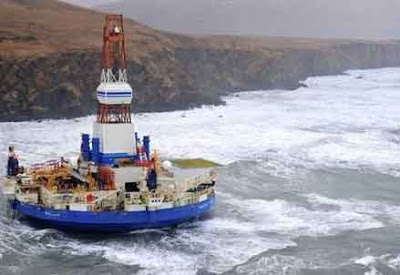
There's no sign of a fuel drip from a petroleum drilling ship that ran aground on a remote Alaska island, the Coast Guard says of a maritime accident that has refueled debate over oil examination in the U.S. Arctic Ocean.
The Royal Dutch Shell PLC ship was being towed to a Pacific Northwest shipyard for preservation when it went aground during a cruel storm New Year's Eve.
"There are still no signs of any sheen or ecological impact and the Kulluk appears to be stable," Coast Guard Capt. Paul Mehler said Wednesday night, after flying over the rig with a Shell representative and an Alaska Environmental Conservation Department official.
He...


















